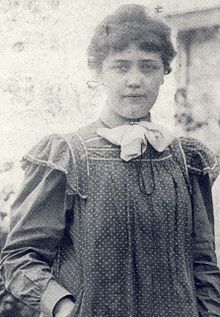Ruth Milles
| Ruth Milles | |
|---|---|

Ruth Milles in the 1890s
|
|
| Born |
Ruth Anna Maria Anderson April 19, 1873 Vallentuna, Sweden |
| Died | February 11, 1941 (aged 67) Rome, Italy |
| Resting place |
Protestant Cemetery, Rome 41°52′34″N 12°28′48″E / 41.876°N 12.480°ECoordinates: 41°52′34″N 12°28′48″E / 41.876°N 12.480°E |
| Nationality | Swedish |
| Education |
|
| Known for | Figurines |
| Notable work | Marble bust of Jenny Lind |
| Style | Impressionism |
| Movement | Realism |
Ruth Milles (19 April 1873 – 11 February 1941) was a Swedish sculptor and writer. She is mainly known for her figurines and reliefs.
Milles was born Ruth Anna Maria Anderson on Örby Manor in Vallentuna near , Sweden. She was the daughter of Chief Verifier of the brännvin manufacturing in Sweden, Emil Anderson (1843–1910), called "Mille". She had two siblings when her mother died in childbirth and gained three half siblings after her father remarried. Her brother was the sculptor Carl Milles (1875–1955) and her half brother Evert Milles (1885–1960) was an architect. Unlike her brother Carl, Milles was a college educated artist. She studied at the Tekniska Skolan (the Technical School), predecessor to the Konstfack University College of Arts, Crafts and Design in Stockholm in 1892–93, after which she went on to the Royal Swedish Academy of Arts in 1894–98, where she was considered talented enough to skip a year. She would also visit the Theosophical Society which became influential for her future works.
In the autumn of 1898, Milles left for Paris, approximately a year after her brother Carl had moved there. She studied at the Académie Colarossi and École des Beaux-Arts, and used Paris as base for journeys through France and Germany. Milles and her brother spent much time together in Paris where they collaborated, artistically and economically, in a joint company they started. Among other things, the company sold small bronze figurines, depicting children and characters from fairy tales made by her. She spent the summers in the fishing village Briac in Bretagne where she would draw inspiration from the local fishers' life for her sculptures. Her sculptures were made in an early Impressionistic style. While in France, she and her brother changed their surname to Milles after their father's nickname. In 1902, she received an honorary award at the Salon in Paris. The next year she fell ill with tuberculosis. She travelled back to Sweden and settled down in Islinge on Lidingö, where she set up a studio which she sometimes shared with the wife of her brother Carl, Olga Milles.
...
Wikipedia
